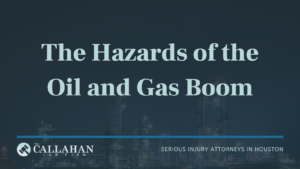The Hazards of the Oil and Gas Boom

Despite the negative impacts the COVID-19 pandemic had on many industries, the oil and gas sector has not only recovered—it’s achieving new highs. Production has surpassed pre-pandemic levels, and struggling oil companies have recovered and boomed. Additionally, exports of crude oil and gas have both hit record heights, outpacing global trade in several major industries, including aircraft, pharmaceuticals, automobiles, and food.
The Post-Covid Oil and Gas Boom
Though there has been a recent emphasis on renewable energy sources such as solar and wind power, oil and gas continues to play a significant role in the global energy mix. This is in part due to the fact that oil and gas are still the most cost-effective sources of energy for many countries. While the cost of renewable energy has decreased in recent years, it is still more expensive than traditional fossil fuels in many parts of the world. This means that for countries with limited financial resources, oil and gas will continue to be the primary sources of energy.
The surge of oil and gas production is also in part fueled by the ever-increasing demand for energy in developing countries. The industrialization, urbanization, and growth of developing nations is creating a never-before-seen demand for energy. A myriad of other factors has affected the oil and gas boom, including the Russia-Ukraine conflict, the petering out of the pandemic, and other economic factors. Even previously struggling drillers have experienced unprecedented levels of growth.
Results of the Boom in Texas
In 2020, Chesapeake Energy Corp. was filing for bankruptcy after the lockdown caused profits to drop. However, last year, the company made $1.3 billion dollars in profit. The nation’s levels of oil production is almost back to pre-pandemic levels, meaning that Chesapeake and similar companies can ramp up production. In recent months, Chesapeake Energy Corp. added a seventh drilling rig in the Haynesville basin, an area stretching from East Texas to Louisiana. This year, there are already 69 running rigs in the basin, compared to just 32 in peak-COVID summer of 2020. And in August of last year, the company reported they had closed a 36-month agreement to supply more than 300 million cubic feet of gas a day to an export terminal located on the Gulf Coast.
The Risk for Texas Workers
However, it is important to note that while the resurgence of oil and gas is good news for the industry, it is not without its risks. The petrochemical industry is heavily dependent on the price of oil and gas, which can be highly volatile. This means that the industry is vulnerable to economic downturns and other economic risks. In addition to the economic risks and challenges facing the oil and gas industry, there are also significant risks of injury for workers in the field. The oil and gas sector is infamous for being one of the most dangerous industries, and for having some of the most dangerous working conditions of any industry. Much of the danger is due to the nature of the work, which often involves working with heavy machinery and equipment, as well as working in remote and inhospitable environments.
Heavy machinery is highly specialized, which makes it a major hazard for those on the job. Oil and gas workers are at risk of being caught in or between equipment, or struck by moving parts and/or falling objects. Oil and gas workers also often work at great heights, such as on offshore drilling platforms. This puts them at risk for falling off of equipment, or having other workers and equipment fall onto them.
Additionally, the volatility of petrochemicals makes oil and gas workers at risk of obtaining injuries in workplace explosions and fires. Oil and gas workers handle highly flammable materials; if mishandled or stored improperly, these chemicals could cause an explosion or fire. Additionally, workers are also at risk of chemical exposure, by inhalation, ingestion, and/or skin contact. Exposure to these toxic chemicals can result in chemical burns and other major health issues.
With the uptick in hiring that comes with an oil boom comes an uptick in inexperienced workers. Oil and gas companies should work to ensure that their employees are properly trained on safety measures and on machine operation in order to ensure their workers stay safe.
—
If you or a loved one has been injured while working on a rig or at a refinery, you need an experienced Workplace Accident Lawyer by your side. Led by former mechanical engineer and Board Certified Personal Injury Lawyer Michael Callahan, our legal team has been representing injured workers and their families for over 25 years. We have a history of success, and we can help you too. Give us a call at 713-224-9000, or fill out our contact form here.

Michael S Callahan is an attorney and founder of The Callahan Law Firm. He focuses his practice on representing individuals and families in personal injury cases involving motor vehicle and truck accidents, workplace accidents and defective products. With over 25 years of experience, he is dedicated to fighting on behalf of people whose lives have been forever altered by the negligence and carelessness of corporations and individuals. Originally trained as a mechanical engineer, Michael has been practicing law and fighting for justice for those who need it most since 1994. He is board-certified in Personal Injury Trial Law by the Texas Board of Legal Specialization and a member of various esteemed legal associations. Outside of work, Michael enjoys spending quality time with his family, outdoor activities, and continually striving to improve as a trial lawyer and human being.











